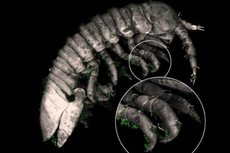Nearly all sea turtles born in Florida are now female due to climate crisis
In 2019, one South Florida scientist had documented only female hatchlings in seven of the preceding 10 years
When sea turtles lay their eggs, the temperature of the sand determines whether that egg becomes a male or female turtle.
But the planet is getting hotter— and that means a lot more turtles, in key nesting sites like Florida, are being born female.
"Scientists that are studying sea turtle hatchlings and eggs have found no boy sea turtles, so only female sea turtles for the past four years," Bette Zirkelbach, who manages a turtle rescue operation in the Florida Keys, told Reuters.
Sea turtles live in the ocean but come up onto beaches all over the world to lay their eggs in the sand.
When the sand is cooler, more of those eggs become males — and when it’s warmer, more of the eggs become females.
The precise temperature at which the change occurs may differ between species and locations, but at around 29 degrees Celsius (84 degrees Fahrenheit) you’ll often see a 50/50 split between male and female hatchlings.
However the climate crisis is pushing temperatures up around the world, and the oceans are filling up with female turtles.
In 2019, the Miami Herald reported that one South Florida scientist had documented only female hatchlings in seven of the preceding 10 years.
These kinds of results are showing up elsewhere, too. A 2018 paper found that while cooler beaches in Australia’s Great Barrier Reef had between 65-69 per cent female turtles, warmer beaches in the reef had upwards of 90 per cent female turtles.
In Cape Verde, an island nation off West Africa, beaches with light-coloured sand produced around 70 per cent female turtles, while beaches with dark-coloured sand produced around 93 per cent female turtles, according to a 2014 study. Dark colours absorb more energy from the sun, making them hotter.
This process is called “feminization” — and some scientists warn that it could be a long-term threat to sea turtles as the climate crisis pushes temperatures even higher, as both males and females are needed for the species to reproduce.
The same issue may also threaten other reptiles whose eggs’ sex is based on temperature, like alligators.
There are some potential mitigations for this problem, such as providing more shade on beaches, covering nests in lighter-coloured sand or moving nests to cooler spots.
But all of these require human interference with the nesting process, which the sea turtles have been doing undisturbed for millions of years.
In addition to higher temperatures, sea turtles face other climate-related threats like sea-level rise and intense hurricanes, which can damage their coastal nesting sites.
Join our commenting forum
Join thought-provoking conversations, follow other Independent readers and see their replies
Comments


Bookmark popover
Removed from bookmarks